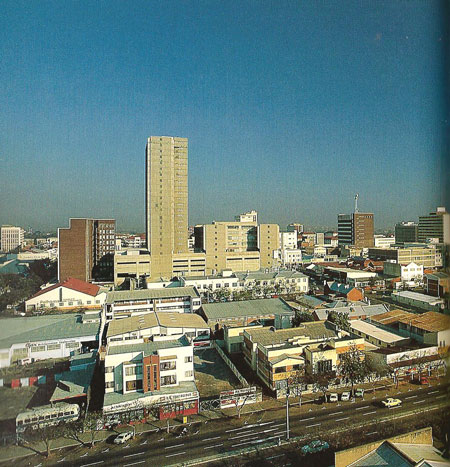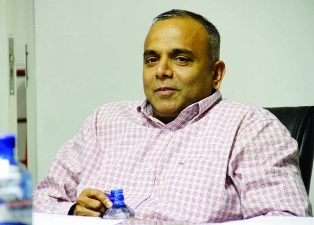
CONFEDERATION of Zimbabwe Industries (CZI) Matabeleland Chamber co-vice president Mpumelelo Mkhwananzi (MM) spoke to Southern Eye Business correspondent Gamma Mudarikiri (GM) on a wide range of issues bedeviling business, commerce and industry, particularly the revival of distressed companies in Bulawayo. Below are excerpts of the interview:
GM: In the 2013 CZI (Confederation of Zimbabwe Industries) congress one of your key resolutions was to lobby the government to amend labour laws to allow distressed industries to recover. Is there any progress so far regarding that aspect?
MM: During presentation of the 2014 National Budget, the Finance and Economic Development minister announced the realisation by the government of the need to expedite the finalisation of the ongoing review of labour laws with a view of making them flexible and linking remuneration to productivity, that way promoting interests of both the investor and employees.
GM: As CZI Matabeleland chapter, what will be your key focus areas this year regarding the revival of industry this year?
MM: In line with the CZI Congress 2013 resolutions, CZI Matabeleland chamber will focus on the following key areas:
- Continued engagement with key stakeholders such as the government and its departments, utility service providers and labour on economic and industry issues. In addition, engagement with potential investors is also on the agenda.
- The need for businesses to adopt viable and sustainable business models that can compete in the global village. Efforts by key stakeholders such as City of Bulawayo who recently outlined incentives to businesses are thus a welcome development towards promoting business viability.
- Granting of special economic zone status for Bulawayo in line with one of the CZI 2013 congress resolutions.
The government put in place the Zimbabwe Agenda for Sustainable Socio-Economic Transformation (ZimAsset) programme as the blue print for the revival of the economy over the next five years. CZI will play its role in helping business to implement the plans.
GM: Companies continue shutting down in the city. How many companies closed shop last year in Bulawayo?
MM: CZI is in the process of gathering data on company closures that took place in 2013. Notably, the following were some highlights, both positive and negative, of what took place in Bulawayo over the same period. On one hand, for example, there were some sizeable investments in new technologies and some companies successfully relaunched their products and increased capacity utilisation.
- Chamisa under fire over US$120K donation
- Mavhunga puts DeMbare into Chibuku quarterfinals
- Pension funds bet on Cabora Bassa oilfields
- Councils defy govt fire tender directive
Keep Reading
On the other hand, some companies had to stall some of their production lines due to raw material input related constraints. There were additions to the list of companies placed under judicial management. None of those that were already under judicial management recovered over the review period.
GM: In your view what do you think should be done to ensure the revival and growth of industry in Bulawayo?
MM: The need for companies to revisit their business models and adopt models that are viable cannot be over-emphasised if local companies can gain the much needed competitive edge. Proper financing structures for industry are required, but need to be applied to businesses whose cost structures are sustainable. Recent initiatives by key stakeholders such as City of Bulawayo who recently outlined incentives to businesses are therefore a welcome development towards promoting business viability. CZI applauds the position taken by the government in allocating funds for the revival of industry in Bulawayo in the National Budget. As a follow through initiative, CZI implores government to speed up the process of according Bulawayo a special economic zone status. This way, the government will protect its investment, attract new investors and stimulate both the revival and growth of industry as well as employment creation.
GM: How much does the industry need to fully recover?
MM: Ascertaining the value of investment required for industry to fully recover is an ongoing process. The following gives an idea of the nature of investment initiatives that are required:
- Infrastructure-sizeable investment outlays are required in road and rail transport, energy, water and other key infrastructure in order to develop sustainable cost structures
- Research and development is-a key ingredient without which industry cannot recover, let alone compete
- New product development is -a critical component in an ever changing environment
- Recapitalisation — most companies are still using outdated equipment and machinery. Banks have chipped in with structures such as asset finance with tenures ranging from three to five year, but remain hamstrung by liquidity challenges.
- Working capital — this is the life blood of business.
GM: What is the outlook of Bulawayo industry in terms of terms of recovery and growth this year?
MM: The Year 2014 has started on a positive note, promising a better rainfall season than the prior year. It is therefore expected that industry will benefit from the relaxation of water rationing programmes that had been put in place to preserve the precious water resource. Zimbabwe’s economy remains weighed down by challenges such as the tight liquidity that characterized the greater part of 2013. The CZI 2013 Congress held in Bulawayo made a recommendation for Special Economic Zones/Special Incentives in order to expedite the inflow of investors in specific sectors and geographies across the country.
It was underlined that Bulawayo can benefit from a special industrial zone status. As already mentioned earlier, such incentives will help improve the city and country’s rankings in terms of ease of doing business.










